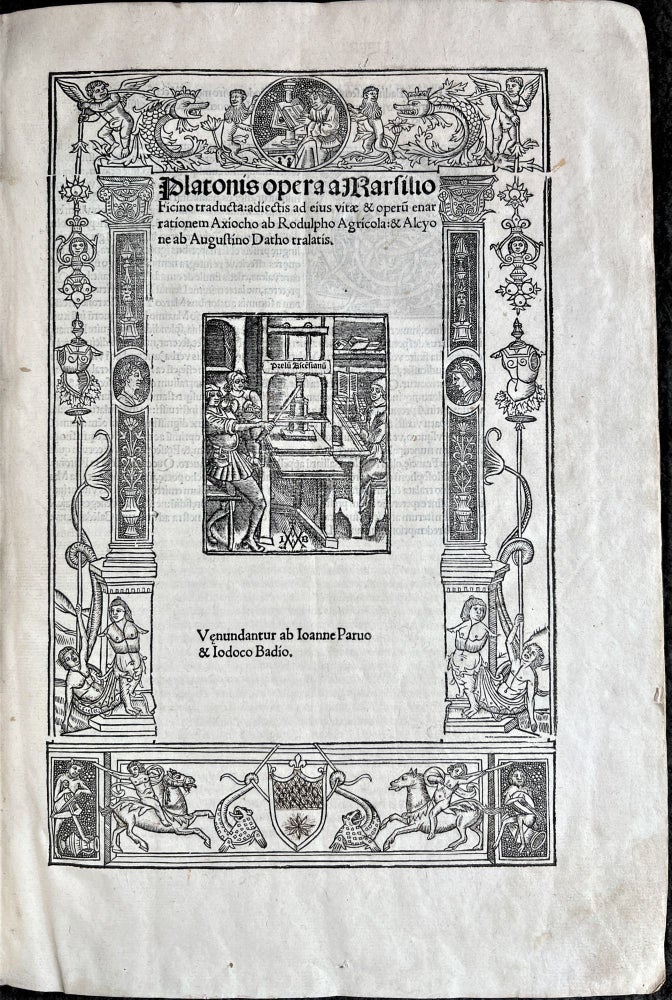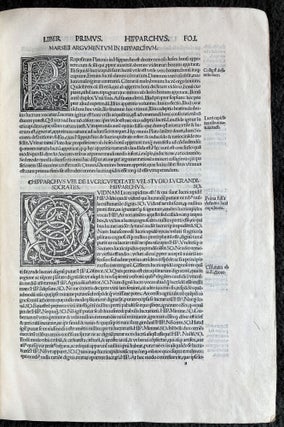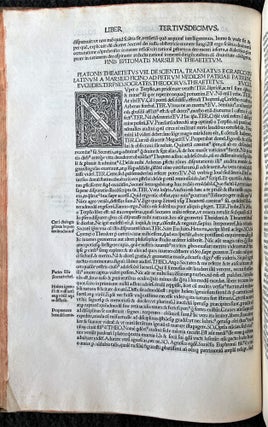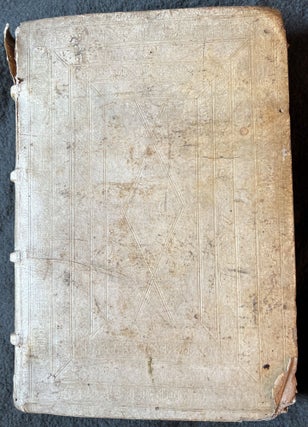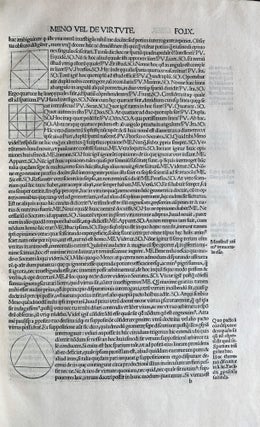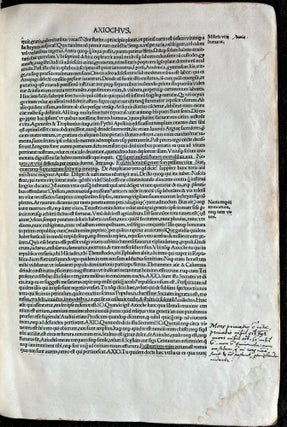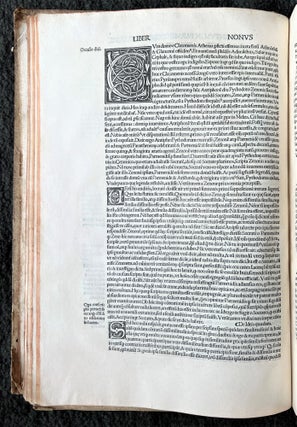Opera a Marsilio Ficino traducta. Paris: Josse Bade for himself and Jean Petit, quinto kalendas Iunias 1518.
Folio (335 x 228 mm). [8], 389 leaves, plus final blank. Roman and Greek types (the latter in shoulder notes). Title within a four-part woodcut border (Renouard Badius border B), with Josse Bade’s woodcut device (Renouard Marques 22 = Renouard Badius 1, state 2), a few text diagrams, metalcut white-on-black initials from four sets, small woodcut initials. Deckle edges in quires v, x, and y. Condition: Two small wormholes in title leaf, one catching a letter on verso, small marginal tear and creasing to last leaf of prelims (ã8), a few other marginal tears or creased corners, marginal dampstain in first quire, marginal dampstaining and wrinkling to last 155 leaves, more noticeable in the last 3 quires. Binding: Contemporary blind-tooled alum-tawed skin over pasteboards, sides panelled with thick and thin rules and two ornamental rolls, a narrower flowering vine roll and a wider roll with classical vases, holes for two fore-edge ties (lacking), spine with early manuscript title and later inked “Plato” and shelf number, edges stained red (worn and rubbed, top of spine torn, revealing stitching, corners abraded). Provenance: two contemporary price notes on front endpapers, a few neat contemporary marginal study notes, occasional underlining in Meno; ink infill to shield in title border, the top half with diaper design and ?fleurs de lis, the bottom with an 8-pointed star (or blossom); the (Episcopal) Bishop of Vermont: bookplate with accession no. 2909, the latter repeated in inkstamp at foot of first dedication page, and bookplate of the Library of the Vermont Episcopal Institute (Burlington, VT): cf. Arthur C. A. Hall, Library of the Bishop of Vermont (1898), p. 52; with William Salloch, Catalogue 328 (1975). ***
First Edition of Plato’s collected dialogues published outside Italy. From the press of the preeminent humanist printer Jodius Badius Ascensius, who shared the edition with his frequent partner Jean Petit, this first Parisian edition of Plato’s complete works was the fourth Latin and fifth edition overall. The dissemination of Plato’s dialogues in print long relied almost entirely on the translation of Marsilio Ficino, “the most central and most influential representative of Renaissance Platonism” (Kristeller, p. 58). Ficino’s mainly accurate translation of the complete known Platonic corpus presented the dialogues to Western European readers as a whole, in the unifying light of Ficino’s own conception of a quasi-mystical Platonism, in which the soul ascends toward God through contemplation of the world. Ficino’s Plato was reconcilable with the Christian religion. In his dedication to Lorenzo de’ Medici he wrote that the “divine spirit of Plato” had been sent into the world to spread the light of religion, and that Lorenzo’s grandfather Cosimo de’ Medici had ordered him to reveal the “sun” of Platonism to the Latin nations. Ficino’s translation circulated in manuscript, and was first printed in 1484-85, (largely) by the nuns of St. Jacopo di Ripoli for Lorenzo di Alopa, in 1025 copies, a huge press-run at the time, which sold out quickly. The Venetian publisher Torresanus issued a new edition in 1491, and another Venetian edition, printed by Filippo Pincio, appeared in 1517, four years after Aldus’s Greek editio princeps.
The present edition by Josse Bade would have been a godsend to the circle of Parisian humanists and scholars whom he served throughout his long career. It sold well, and Bade had to reprint the text in 1522. Printed, as asserted in the colophon, “with even more care than usual,” the text includes Ficino’s argumenta, or short commentaries, his longer commentaries on the Symposium and Timaeus, and his Vita Platonis. New to this edition are the dialogues Axiochus and the pseudo-Platonic Halcyon, translated respectively by Rudolph Agricola and Agostino Dati, not included in the earlier editions. Bade dedicated his edition to Michel Boudet, Bishop of Langres, a proponent of Greek learning and patron of French humanists. Beautifully printed, with the elegant and oft-copied Badius title border, celebrated Ascensius Press device showing printers at work, and fine arabesque metalcut initials, this important edition appears infrequently in the book trade.
A wide-margined copy, preserved in its contemporary binding, this has an American provenance. The library of the Vermont Episcopal Institute was founded in 1854, by the first Episcopal Bishop of Vermont, the rather colorful John Henry Hopkins (1792-1868). It is likely that this volume was part of his private library, which became the property of the Diocese in 1834 (cf. J. H. Hopkins II, The Life of the Right Reverend John Henry Hopkins, p. 203).
Adams P-1443; Hoffmann III:138; P. Renouard, Bibliographie des impressions et des oeuvres de Josse Badius AscensiusB III: 168-169; P. Renouard, Imprimeurs et libraires parisiens du XVIe siècle, II: p. 168, no. 389; cf. N. G. Wilson, From Byzantium to Italy: Greek studies in the Italian Renaissance (1992), pp. 90-95; P. O. Kristeller, Renaissance Thought and its Sources (1979). Item #4203
No longer available
Status: On Hold

